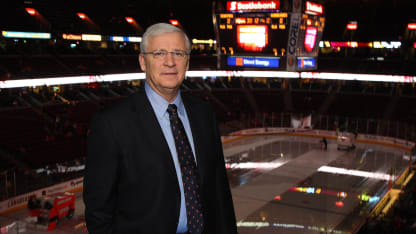Let us not talk about wins or successful drafts, but of promises made and kept and of confidence given and courage shown. Because those are the qualities that we remember today when we remember Bryan Murray.
Of course, Murray, who passed away Saturday after a three-year battle with colon cancer, was a shrewd judge of hockey talent and a passionate, well-respected coach - you don't get to hang around the National Hockey League for 35 straight years, coach 1,239 games, and win a Jack Adams Award without having the game in your DNA - but that the memories being celebrated today are more often of his wit and humanity is the truer mark of the man.
Dallas Stars netminder Ben Bishop spent a relatively short period of time with Murray's Ottawa Senators, parts of two seasons, yet Murray may well have been one of the most influential people in Bishop's career.
Remembering Bryan Murray
Murray, who passed away after a three-year battle with colon cancer, was a shrewd judge of hockey talent and a passionate, well-respected coach

Bishop was in the team's hotel room in Boston on April 3, 2013 when Murray called Bishop to tell him he'd been traded from Ottawa to Tampa for Cory Conacher and a fourth-round draft pick.
What made the call so memorable is that earlier Murray, the Senators GM, had told Bishop, third on the team's depth chart behind Craig Anderson and Robin Lehner, that he wasn't just going to move him to the first team that came calling, but that he was going to try and find him a team where he would have a chance to be a starter.
Tampa was that team and Bishop went on to two Vezina Trophy nominations and was a key part of a renaissance in Tampa that saw the team advance to the 2015 Stanley Cup Final and an Eastern Conference Final the following spring.
Where would Bishop be had Murray, 74 at the time of his passing, not been true to his word?
It's something Bishop ponders in the wake of Murray's death.
"He lived up to what he said," Bishop said. "It wasn't as much a business transaction as helping somebody out."
"If it wasn't for him, you don't really know where you'd be," added Bishop, who was acquired by Dallas from Los Angeles in the off-season and then signed to a six-year extension with the Stars. "I'll always be grateful for that."
It is the nature of the game, which more often than not acts as a small community spread over a vast geography, and it's likewise the nature of Murray's widespread impact on the game having coached or managed with five different NHL franchises, that you'd be hard-pressed to find a team in the NHL that isn't today dotted with players, coaches, and managers who aren't remembering their own Murray moments with an equal mix of smiles and tears.
The Dallas Stars are no different.
Stars center Jason Spezza figures Murray had as big an impact on his career as any person.
"He almost talked to me like a son," Spezza recalled. "He kind of had that schoolteacher in him in that he genuinely cared for his players."
Murray, one of 10 children from the small Ottawa Valley town of Shawville, Quebec, attended Spezza's wedding and kept tabs on Spezza's growing family.
"Looking back, I wish he'd coached us longer," the veteran center and father of four said. "Because I think he was a phenomenal coach and he was guy that you really wanted to play for."
Spezza recalled his first meeting with Murray when Murray took over as head coach of the Senators after the 2004-05 lockout.
During his first meeting with the players, Murray made sure not to try and hide his mild speech impediment that saw him lisp of words with 's' or 'z' sounds.
"We were kind of excited," Spezza recalled. "We kind of got around him. And you heard lots of stories about his sense of humor and everything, and he calls everybody in and he's got the distinct lisp and he brings it out first and foremost, one of the first things he mentioned to us was his speech, and he said if you can't understand me let me know because I'll yell at you type of thing. I remember he brought it right out into the open and from that day on I think that just showed the wit that he had."
"He always kept you on your toes," said Spezza who was selected by the Senators with the second overall pick in 2001. "He just had that kind of wit and sarcasm that can't be taught."
Spezza's recollections put us in mind of one typical Murray moment in the spring of 2006.
Starting netminder Dominik Hasek had been injured early in the Olympic tournament in Turin, Italy and was unable to return to action during the regular season. With Hasek skating every day there was high anticipation that he would return to action at any moment, even as the Senators fell behind Buffalo 3-0 in the second round of the playoffs. The morning before Game 4 in Buffalo, Murray was asked who his Game 4 starter would be.
Without hesitation Murray announced it would be Dominik Hasek.
There was stunned silence for five seconds, maybe more, before Murray's eyes lit up.
"Just kidding. It's Ray Emery," Murray said and the room broke up in howls of laughter.
For Spezza, the emotion runs deep in remembering a man who was both coach and general manager during Spezza's time in Ottawa. Regardless of the role he played, one thing was constant and that was his mentoring of Spezza.
"He took a liking to me," Spezza recalled. "He really liked to push me and grind me a little bit."
Yet for all the times Murray would challenge Spezza to be better, there were the moments of success for the big center that Murray took special pride in as well, reveling in Spezza's success that belied the normal coach/GM relationship.
"When my game needed a little bit of help he was always there for me," Spezza said.
When it came time for Spezza to move on as the Senators charted a different course, Spezza said the fact he was dealing with Murray made it a little easier as the June 2014 trade to Dallas took shape.
In the ensuing years, and especially after Murray was diagnosed with cancer and became a vocal spokesman for regular cancer screenings, Spezza made sure to get to the rink early whenever the Stars and Senators played to ensure he got time to catch up with Murray, who always seemed to know exactly what was happening with the Stars and specifically with Spezza.
As an Ottawa native, Marc Methot grew up knowing about Murray and his reputation as a top hockey man before he got to know him as a member of the Senators after Ottawa acquired the big defenseman on July 1, 2012.
As an executive, Murray gave his players space, but when he did make his way to the dressing room, the guys knew the message was important, Methot said.
Methot, acquired by Dallas from the Vegas Golden Knights this summer after Las Vegas selected him in the expansion draft, recalled a moment in New Jersey when the team was playing poorly and Murray made his way to the room and pointed out in no uncertain terms what he felt was ailing his team.
"He pretty much tore into all of us," Methot said with a laugh. "We always responded. The team just seemed to win a lot of games after a Bryan Murray speech."
As the Senators improbably made their way to a seventh game of the Eastern Conference Final this spring, finally dropping a memorable double-overtime decision to eventual Stanley Cup champion Pittsburgh, Murray was still visible despite his deteriorating health.
Methot recalled seeing him greeting fans and players alike as though he had nothing on his mind other than the hockey at hand.
"These are the little things that people don't realize but when you're battling cancer and you're feeling like (crap) this guy still had the time of day for everybody," Methot said. "He was a tough son-of-a-bitch and nobody can take that away from him."
We should all be so lucky to be so remembered.
This story was not subject to approval of the National Hockey League or Dallas Stars Hockey Club. You can follow Scott on Twitter @OvertimeScottB.


















